When I went to my GP because I was concerned about feeling emotional, tearful and anxious in my early 50’s, which was so unlike ‘highly- motivated-and happy-me’, my doctor never once spoke about tryptophan, gut health, sunlight, my circadian rhythm and calming aerobic exercise. Nor my stress levels. He spoke about anti-depressant medications instead. I told him I would think about it.

That day was a turning point for me. Because as I scanned the women’s health research whilst doing my doctoral studies, I began to look for scientific articles about the relationship between our changing hormones in menopause, mood and depression. I also learnt that 2/3 of women in New Zealand, Australia and the United Kingdom are placed on anti-depressants in mid-life. And yes, whilst this is a line of intervention for women in menopause to help them sleep and feel better, I wonder how many are told about all the other lifestyle strategies that they need to put into place as they move through menopause into their biological ageing. I also wonder, how many of these women are supported to reduce or remove the reliance on anti-depressants as they go into post-menopause and do some aerobic exercise to boost their endorphins and mood hormones instead.
My curiosity about why our mood and motivation changes so suddenly as we get into our mid-life years, lead me on a journey of self-discovery about how our changing reproductive hormones in menopause also change the powerful mood and motivation hormone, serotonin. Most importantly, my journey took me towards the lifestyle research on depression about how to turn serotonin levels around naturally.
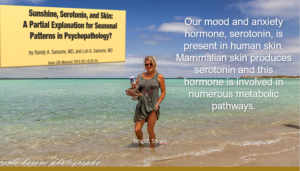
Not only does the production of serotonin reduce in menopause, but because our gut health changes as well, serotonin production can be reduced even further. Especially if we don’t get enough exposure of our skin to sunlight. Serotonin production begins in our skin and with our skin containing numerous oestrogen receptors, menopause is a time when we become vulnerable to a reduction in serotonin production. If you work inside all day, then yes, your risk for low serotonin production increases.
Over the past year, I have spoken to hundreds of women, who are left wondering why their anti-depressants aren’t helping their mood and sleep to improve.
This leaves me wondering if they aren’t exposing their skin to sunlight, or if they might have gut-health problems too.
The gut is important in menopause. Oestrogen receptors in the gut lining are reduced and our gut and bowel are more sensitive to certain foods, chemicals and stress. It’s often forgotten that the same nerve that controls your adrenal glands also goes to your stomach and small intestine. Stress increases gut problems and vice versa.
Knowing that serotonin is reduced with our natural ageing as we move through menopause is powerful knowledge. It’s one of the things I talk about in my 12 week programmes. We need to help our body make more serotonin naturally and this requires a protein called Tryptophan – and sun exposure on our skin as well as a good night’s sleep. When we don’t sleep, not only does the day seem longer, but we grab sugary foods as our energy levels plunge and our thyroid metabolism gets thrown out of balance too – this makes our hot flushes worse.
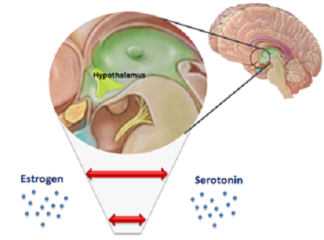 90% of serotonin is found in the intestine and the remainder in the central nervous system. As a major nerve-transmitter, this powerful hormone, helps to regulate mood, anxiety, control the reproductive cycle, the cardiovascular system, the circadian rhythm, libido and helps to manage stress. We need serotonin in our lives.
90% of serotonin is found in the intestine and the remainder in the central nervous system. As a major nerve-transmitter, this powerful hormone, helps to regulate mood, anxiety, control the reproductive cycle, the cardiovascular system, the circadian rhythm, libido and helps to manage stress. We need serotonin in our lives.
When serotonin is low, we experience lethargy, worry, sleep disturbances, anxiety and hopelessness.
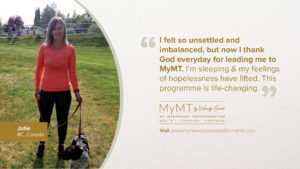
The physical symptoms of menopause can be a tough time for women – hot flushes, weight gain, night sweats, poor sleep and aching joints to name a few! When you add on serotonin depletion, life just gets a bit tougher too.
But here’s the thing, it’s a catch-22 – although lowering oestrogen causes serotonin production to dive, low serotonin also causes changes to our circadian rhythm and our gut health. When our gut health is affected and we aren’t sleeping well (as many nurses and shift-workers find), and we feel stressed (physically and mentally), these factors accummulate to affect serotonin production too.
Knowledge is always power, so understanding this crucial link with menopause and serotonin production, led me to ask myself a very simple question –
“If menopause is the time of life when millions of women start taking medication for their mood swings and anxiety, then how can I better plan my day, prepare my food and do the right exercise, so that my body is making serotonin and I feel more like my old self?’

That’s when I began to plan my day to optimise boosting my happy hormone, serotonin. My morning routine was crucial as many of the women on my programmes discover too. For improved serotonin production and better sleep quality, your morning routine is your ‘non-negotiable’ start to your day on the MyMT programmes. Getting light in the eyes in the morning, helps you to regulate your circadian rhythm, which is your 24 hour biological clock. When you have a well-functioning Circadian Rhythm, then your brain produces more serotonin and you sleep better too.
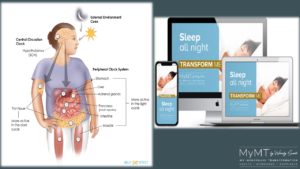
Early-morning light in the eyes is important and it’s why, I tell women to try and walk outside in the mornings. Which may mean, as I found, a mind-set reset in your morning routine.
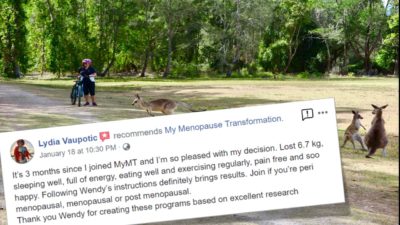 Moving aside my role of making my teens lunches and getting them out the door was the change I made personally. When I began to experience worsening mood swings I was 51 – bang-on the average age for menopause which is when our periods stop for a year or more. At the time, the kids were 16 and 14 years.
Moving aside my role of making my teens lunches and getting them out the door was the change I made personally. When I began to experience worsening mood swings I was 51 – bang-on the average age for menopause which is when our periods stop for a year or more. At the time, the kids were 16 and 14 years.
But here’s the thing. I was so busy getting them organised to have their ‘best day’, that I wasn’t getting myself organised to have my ‘best day’ and to better look after myself in my changing hormonal environment. Every morning I felt rushed and ‘wired’ trying to not only get them to school, but getting myself to work. The forgotten stress of the modern, working mother in menopause that never gets factored in to discussions about our symptoms. As a generation of women who have so much choice around having children later in life, many of us end up coping with menopause whilst having teens in the house. Low serotonin during menopause does not make for harmony in the house, especially at exam time. 😅
The connection between how we live our lives and our changing hormones during menopause is important. It’s a connection that I’m often talking about in the MyMT™ coaching groups, where there are hundreds of women just like you.
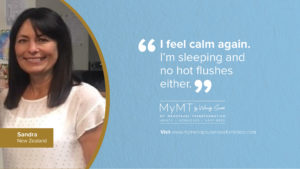
When we understand that we need to look after ourselves differently at this time of life, then we can do things purposefully to make ourselves more resilient to our environment and our situation at home and work. This helps us feel calmer and in control – both good things for improved moods and energy levels.
Changing my morning routine was non-negotiable – I needed to use it to boost my serotonin levels ready for a busy day ahead teaching at the university, so I re-set my motherhood-mindset and empowered the kids to take care of themselves more. They were very capable. However, like many modern mothers the world over, I was locked into doing most things at home to get them out the door to school. Slowly I changed this. I began to get them to make their lunches the night before and I made mine too. Something I hadn’t done for decades.
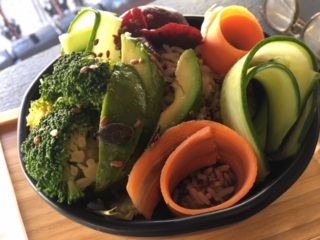
In my lunch every day, went TRYPTOPHAN-RICH FOODS – this important nutrient boosts serotonin. The more I began to understand the connection between menopause, gut health, tryptophan and serotonin production, the more I focused on this important nutrient. Because it’s absorbed in the small intestine, I also focused on my gut health [and I have a module about how to turn around gut-health, which is in both of the MyMT™ programmes]. Tryptophan rich foods not only help to make serotonin, but they also help to make your sleep hormone, melatonin. It’s why, if you want to help to turn around your sleep, the type of food you eat and when you eat it, is important too.

Foods that are high in TRYPTOPHAN need to be included in your daily diet when you are going through menopause. Then you also need good gut health to be able to absorb all of this lovely tryptophan. That’s why in the MyMT™ Food Guide, you’ll learn to include these foods:
– Almonds, cashew nuts
– Salmon.
– Organic Chicken.
– Oats, Brown rice
– Organic free-range eggs (although I do restrict eggs for women like Dianne, who has done the weight loss, ‘Transform Me’ programme because eggs contain the most oestrogen out of any foods and for those women who are putting on weight, then you are already oestrogen dominant)
– Chickpeas (e.g. hummus)
– Green Peas
– Grass-fed beef
– Banana (slightly green banana’s are also high in potassium).
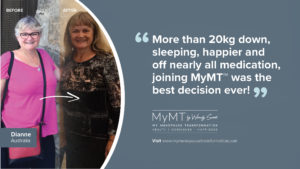
My goal for all women who join me on the MyMT™programmes, is to understand that not only do we need the nutrients that are affected by our changing hormones in menopause but we also need to understand the ‘whole body’ approach.
If we know that tryptophan makes serotonin and that 90% of serotonin uptake occurs in the small intestine and that this is mainly overnight, when we are resting and sleeping, then we need to ensure that we optimise nutrient absorption by focusing on our sleep as well as our gut health.
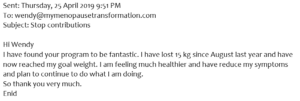
Optimising nutrient absorption is also important. Which is why eating meals when you are sitting and resting helps digestion and nutrient absorption. Full digestion can take up to 16 hours so as I say to women on the MyMT programmes, “we don’t need a lot of food, just the right food! ”

Our menopause transition is a time when we have to pull together sleep, circadian rhythm, food, exercise (not too high intensity until you are sleeping well), liver, gut and joint health renewal and stress management techniques.

When we do this, our symptoms go away and we feel like our old selves again without having to rely on all the various medications and supplements that are marketed to us at this time of life. I took so many supplements and HRT, but none of these got to the heart of the issues, which required changing our lifestyle to suit our changing hormones as we age.
We all have so much of life still to enjoy, which is why my passion is helping women from all over the world get back to feeling like their old selves again. If you’re struggling, I hope you can join me too.
Wendy Sweet, PhD/ Women’s Healthy Ageing Researcher & MyMT™ Creator & Coach.
References:
Environews (2008). Benefits of Sunlight: A bright spot for human health. Environmental Health Perspectives, 116(4), 1-8.
Osaali, A. et.al. (2016). The Effect of Twelve-Week Aerobic Exercise on IL-6 level and depression in 50-65 Years Old Women with Syndrome Metabolic. Med J Tabriz Uni Med Sciences Health Services.
Saurabh S., Berman, A. et.al. (2019). Circadian rhythm of vascular function in mid-life adults. American Heart Association, DOI: 10.1161/ATVBAHA.119.312682.)
Sansone, R .& Sansone L. (2013). Sunshine, Serotonin, and Skin: A Partial Explanation for Seasonal Patterns in Psychopathology? Innov Clin Neurosci. 10(7–8):20–24.

